By Priya Bhattacharji
There was a time when the only genre that made me shudder was not Lovecraftian horror but the conscientious Indian documentary: documentaries made about India by Indians and foreigners, diligently addressing India’s teeming problems. The goal of these documentaries was to throw light on issues through a pity-inducing tanpura, poetic drones, generic poverty porn shots, grim-faced interviews — typically manipulative elements that made the filmmaker appear noble.
In no way do I intend to mock the filmmakers or their concern for social causes, but frankly, viewing such documentaries was no easy task. I have painfully sat through unwatchable, dull documentaries, simply in solidarity with the concerned issue. As we know, often, “intentions” alone don’t, and should not, define a film.
In recent times, with gems like Katiyabaaz, Placebo and some others, the riveting homegrown documentary has captivated Indian and international audiences alike. The landscape has changed, ever so little. In a post-truth society, it appears that the documentary ceases to be a mere medium of information, a pulpit to preach from or an over-ambitious agent of change. Instead, through compelling stories as a catalyst of provocation, it seeks to stimulate audiences — to inspire rethinking, and to shape informed perspectives.
In 2010, I stumbled upon a well-crafted photo-story made on the gentrification drive in Delhi during the Commonwealth Games. With its audio-visuals beautifully interspersed, “Notes from a Beautiful City,” by Rintu Thomas and Sushmit Ghosh, drove home its point effortlessly. Since then, I have kept close watch on Black Ticket Films – the production house co-founded by Rintu and Sushmit. Over the years, I have observed Black Ticket Films churn out the most intriguing documentaries that have travelled far and wide, both online and offline.
When I do finally manage a chance to interview this multi-award winning duo, curiosity about their personal life story (they are married!) threatens to take over my journalistic curiosity about their work. Either way, this conversation proved to be an intimate insight into their world — and by extension, their career:
I’m sure cinema played Cupid somewhere?
Rintu: We met as batch mates during our Masters at the Mass Communication Research Centre in Jamia University – we’ve been friends first, and cupid struck us quite late. Our friends always joked about us, so when we decided to get married, the invite said, ‘we’re no longer in denial!’
Sushmit: On the contrary, cinema had nothing to do with us. Rintu and I have had a crazy ride together — our close friends have asked us to write it into a story. So you might just end up seeing it on screen one day.
Let’s talk about work then. How has 2017 been so far?
Sushmit : 2017 has been a very interesting run so far. We’ve ventured into the feature documentary space and are currently producing-directing a film under the Black Ticket Films banner. On the client side, we just completed a campaign for the World Health Organisation that is going to positively impact the lives of millions of people across South-East Asia and are working on another national campaign, specifically focusing on road safety in India. It’s a mixed plate with a set of very interesting clients and a hot indie being incubated in-house. We couldn’t have asked for more.
Rintu: After working with short-format documentaries for 8 years, it is our first plunge with a feature-length story. And what a dive it has been! Early this year, we pitched this story at the Sheffield Doc Fest in the UK in June (one of only 60-odd projects in the world that got to pitch exclusively to a handpicked array of the world’s leading commissioning editors, broadcasters and sales agents) and got selected to take the project to the IDFA Summer School in Amsterdam, which has been an unforgettable experience in how it brought together the world’s best documentary professionals to learn from each other. The project has also won support from the Alter Cine Grant (Canada), IDFA Bertha Fund (Netherlands) and the Gucci Tribeca Fund (United States). These experiences have enriched us with a very strong global industry interface through meaningful partnerships and beautiful friendships. That’s the wonderful thing of being in the business of telling stories – it’s as emotional as it is logical and commercial.
Sounds extremely interesting. What is this feature about?
Rintu: 2017 has been a roller coaster politically across the world. India’s story is no different. The narrative of the film responds to the rise of right-wing fundamentalism and in that way, we are in the process of taking a very different kind of journey with our characters – different from what we set out to do when we started off late last year. And that’s always the most exciting part of working in non-fiction. The political has always been the personal for us and our films have always been a response to the environment that they’re a part of. Sometimes it’s a critique, sometimes a celebration.
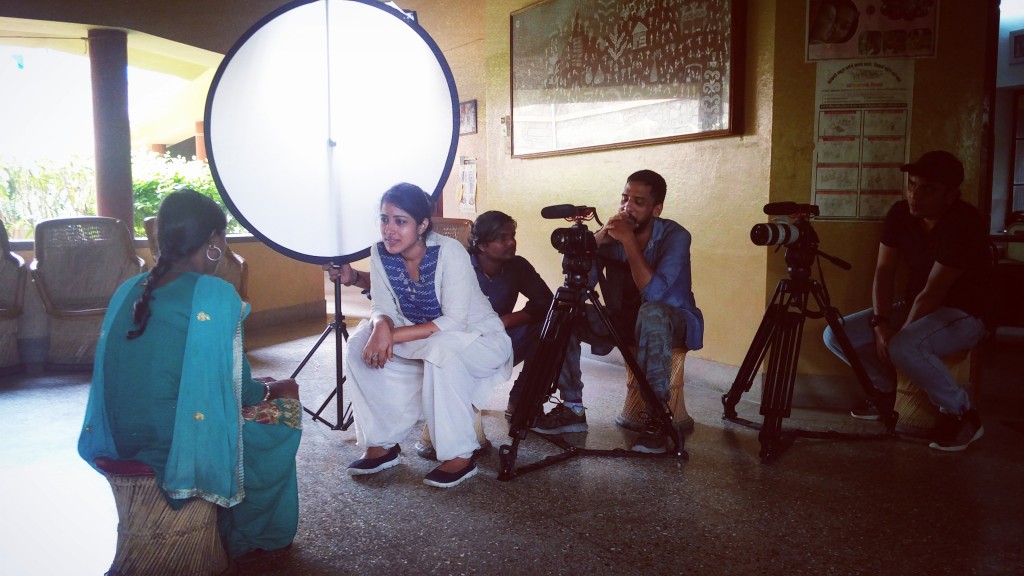
You tend to get slotted as ‘documentary makers’ as opposed to film-makers. How does this perception affect business?
Rintu: I wear that tag with a certain amount of pride now. The aim has always been to make the form of the documentary more exciting, accessible and meaningful for regular audiences. We’ve had the beautiful opportunity to work with a wide array of clients whose work resonates with the values we stand for. Environment, agriculture, food security, access to healthcare, access to sanitation, child rights are themes that feature in our films quite often, told through the personal stories of ordinary people. In our independent work, which is produced solely by Black Ticket Films, it’s the same values of dignity and courage of the ordinary that we’re going after. The audience for our films has also been so diverse and it’s led to an unbelievable impact. From an entrepreneur whose sinking edible cutlery business roared back into good shape through our film’s global digital audience pouring in support, to our recent film for WHO that has been instrumental in affecting changes in the Hepatitis care policy for 11 South East Asian countries – we are constantly working towards ensuring that our films are a gentle nudge for people to act. I think it’s a rare blessing to have our commercial work resonate so beautifully with our personal values. A lot of our business is purely word-of-mouth or references or hits on the website. So when people come to us, they have a fair idea of what they’re in for. Of course, there are still one-off queries about whether we make ‘films’ or ‘documentaries’. 8 years and over 50 films down, it’s something we now we find amusing to respond to.
Sushmit: Bring us a story to tell and we’ll find you a form that’s apt for it – that’s one of the philosophies Black Ticket Films was founded on. Every story finds its own form and that we wouldn’t restrict ourselves to purely non-fictive styles. Over the years, we’ve incorporated kinetic typography, different genres of music, animation and still photography into our live-action work and have played around with the idea of what a documentary is supposed to ‘look’ like. While we have our critics, who profess that our films sometimes look too slick or beautiful to fit into what they have come to understand as the documentary form, we’ve been lucky to have the majority react positively to our work.
And what is it that made these ‘slick’ and ‘beautiful’ documentaries successful?
Rintu: The journey with each of our films, has taught me one thing– people care. How else would strangers from 20 different countries come together on World Refugee Day to screen our film ‘In Search of My Home’ simultaneously in their own homes, schools, colleges, offices, cinema halls, if it was not their desire to care about the struggles and hope of a Burmese and an Afghan refugee in search of a home in India. And this happened in early 2010, when words like ‘viral’ and ‘paid likes’ were alien to our everyday parlance. ‘Notes From a Beautiful City’ (2009) and ‘Dilli’ (2011), short documentaries on what ‘development’ means in urban cities – both films again in the heydays of social media, were organic viral hits. Universities and Film Festivals across the globe still write to us wanting to screen these films to their audiences. ‘Timbaktu’ (2012) is the story of farmers in Andhra Pradesh who radically set out to switch from chemical to organic agriculture. The film brought us a National Award and more importantly, it continues to be used by many NGOs across India in campaigning for organic agriculture even as the government continues to subsidize chemical agriculture. Friendicoes, an animal care NGO in Delhi, was shutting down its emergency services owing to a cash crunch. We designed their online campaign and raised over INR 60 lacs in just one month. When we met the social entrepreneur whose story features in ‘Edible Cutlery’ at his home in Karnataka, he was on the verge of bankruptcy after investing everything (including his own home) in his venture. In just 10 hours of the film going online, he called us back saying he’s received orders from across the world worth INR 1 crore in just one night. Each of these films is a response, a dialogue, and the way people have embraced these narratives, shared them, critiqued them is solid proof that they’ve not been monologues.
Sushmit: My first film Bullets and Butterflies was a 7 day video diary that I shot with a young street child, Rajesh, who had lost both his legs in a train accident. I went on this trip as a breather after quitting my corporate career, ended up recording the journey only on the insistence of a friend. No crew, only a borrowed handicam to shoot. It evolved from being a road-film to one about a friendship between two people from very different backgrounds, to a gentle insight into what it means to be a child of the street. Much to my surprise, Bullets and Butterflies ended up traveling to film festivals across Asia, Africa, Europe and North America, picking up a few international awards along the way. Making this film became a journey into my own film school. Bullets and Butterflies has been my most intimate, raw soul captured on tape. It’s a story about a nascent friendship that develops into something more over a motorcycle ride into the mountains. But it’ll remain something that changed me in many ways. Our Master’s project at MCRC, Jamia, titled Flying Inside My Body, was a biography on photographer Sunil Gupta, who is both gay and HIV positive. It was made back in 2008 when there was a raging debate in the country about Section 377, opening up TV debates about sexuality, gender identity and the construct of the body in Indian society. Today, I feel both privileged and lucky to be in a space where I’m really enjoying my work. The fact that there is tangible, credible change and impact that I can measure through what we produce is really satisfying.
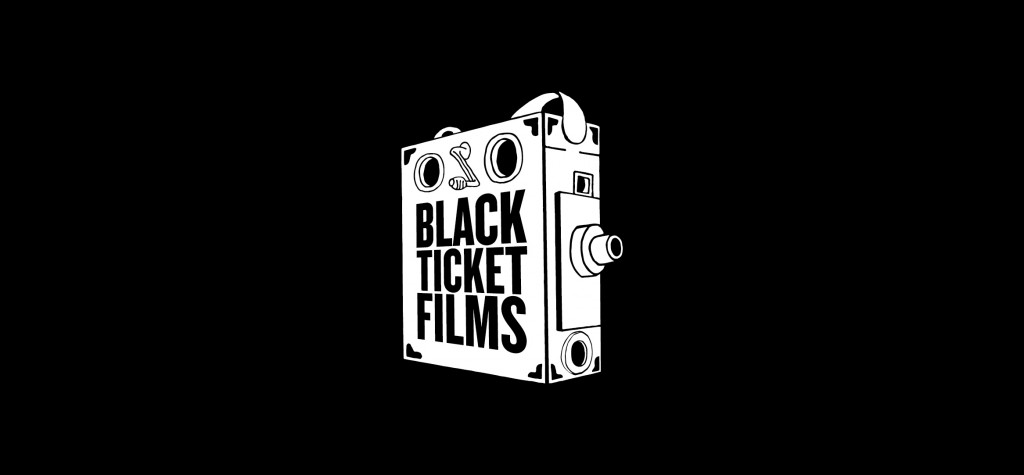
Black Ticket Films is quite an interesting name. You’ve changed your logo since I last remember it. How has the company evolved?
Sushmit: Black Tickets have now become a novelty in the era of digital. We’re kids from the ‘80s, a generation lucky to have experienced the transition from analogue to digital to virtual. The buying of film tickets in black was a norm in this era, especially when the film was one of those run-away hits or the ‘phoren flims’ that were touted as steamy watches for gawky young boys. A ‘black ticket’ is something that is on the border – it’s possibly felonious and yet not frowned upon when the purchase of a bootleg product leads to a cinematic experience that leaves you breathless. So that’s how we came about with the name – Black Ticket Films – it’s a bit of this and that, a bit of edgy, borderline material (that you won’t see on our online platforms) as well as some wonderful storytelling.
Rintu: We’re a small, tight in-house team that works with a vast pool of freelance professionals. It’s in the people who we work with that sometimes I find this value reflected the most. Our cinematographers, editors, assistant directors, scriptwriters refer to the project they’re working on as ‘our film’. It’s not a client film, not a product film, not an NGO film, not a corporate film, not a training film – but our film. It’s this sense of ownership, and satisfaction of creating something you consider your own that we cherish the most at BTF, with each hand picked for their strengths, skills and their experiences that they bring to the project. We’re inclined to hire people who’re driven by the desire to create value, bring energy and refreshing ideas to the table, dig references that surprise even the most voracious Vimeo fans amongst us. We’ve changed our address from a small corner of Sushmit’s home to a lovely sunlit office. Our logo and branding has evolved to reflect what we have come to represent over the years, but this thing about bringing your whole self to work has remained intact.
I quite like your Facebook page. It’s not all about self-promotion.
Sushmit: Our Facebook page is a space where we love sharing films, posters, trivia and anecdotes from across the world. The whole idea is to have people on your page absorb, enjoy (and possibly learn) a thing or two. What’s the point of self-promotion when they’ve already liked your page? Our posts can be quite whimsical – when we’re traveling on assignment, there’ll be no posts for weeks. And on a good day, we’ll pepper the feed with 20 posts in a day.
Rintu: We belong to the generation that has seen social media evolve from Orkut to the Blue Whale challenge. If used intelligently, it’s an extremely resourceful platform that connects people with a sense of immediacy and intimacy that no other form of media has achieved so far. And that’s what we take to social media for – to communicate, to share, to question, to just have fun. There’s a lot more to all of us than the work we do at Black Ticket Films and we like our social media handles to reflect that.
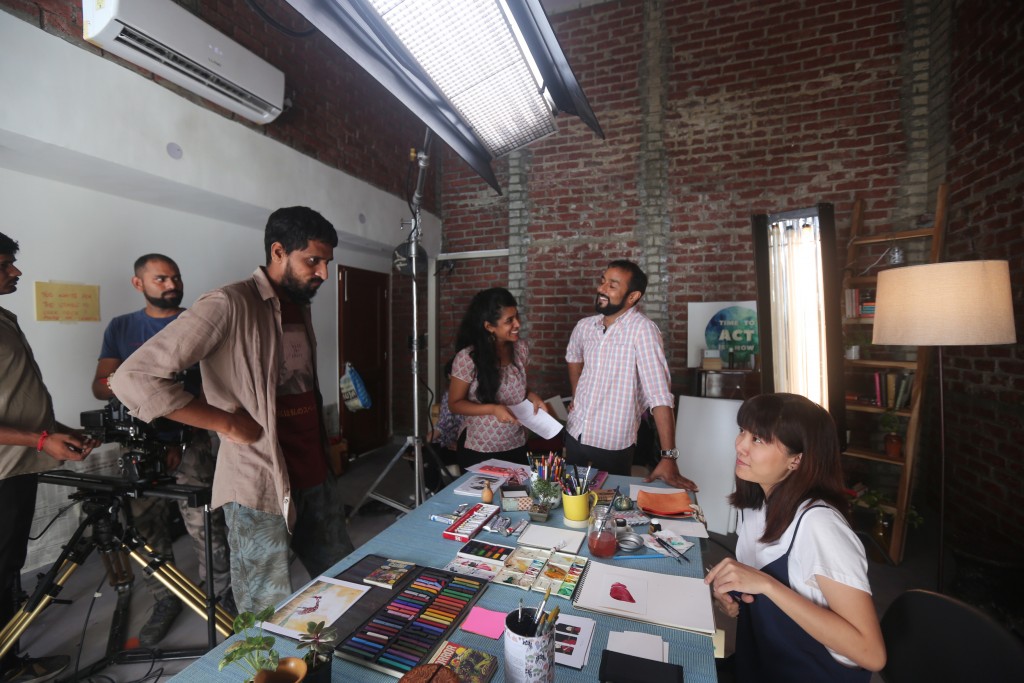
On the sets of the WHO project with Indonesian artist Grace Djiauw and longtime collaborator cameraman Karan Thapliyal (left)
What are your views on Delhi’s filmmaking scene and the indie scene in general? A lot seems to be happening, but the migration to Bombay is still a trend.
Sushmit: The Indian indie film scene is blossoming. Every year, you have younger directors and richer stories, which is a testimony to the vibrancy. I had the opportunity to be a jury member on the recently concluded 64th National Film Awards. I was equally delighted and reassured to have seen such wonderful non-fiction work from all across the country. More collaborations are taking shape, and constantly evolving technology is making film tools more accessible. There seems to be a greater sense of adventure and risk that storytellers are willing to take, which bodes well for India. We still have a long way to go when it comes to being able to compete internationally in the non-fiction space, but over the course of the last couple of years, Indian films have left their mark in the international circuit.
Delhi has a strong indie scene. A few production houses here are openly encouraging and fostering young talent to produce both short fiction and non-fiction. We’re constantly asked to set up office in Bombay, with one client even offering to host us in a posh office space in BKC. There seems to be an interesting rhythm in Delhi that we’ve gotten very used to, and I feel that the city has a lot to offer culturally that still remains under the radar. And personally, the mountains are a quick getaway from Delhi: a much needed breather between everything that we do. So it might take some more time before we decide to dapple with the idea of a move to Bombay.
Rintu: The decision to stay and thrive in Delhi has been a conscious one. We get queries from advertising agencies in Bombay on our non-fiction work that the ECDs have seen somewhere or the other. The idea is to be rooted in one city and be equally flexible to work anywhere in the world. We’ve created a certain rhythm to the way we choose projects and Delhi is home. The city is extremely vibrant with music, photography, theatre – it’s mostly impossible to catch up. What I’d love to see is more film festivals, independent spaces for screening and watching films together.
Besides watching and making films, what else do you guys like?
Rintu: We love lazing about in the mountains or next to the sea. Our friends keep us adequately busy in our free time, and then there’s always that book we want to read together. We both enjoy the small things in life – a Sunday with grandparents or a late night green tea session with a book at home. We love this space; it’s a different kind of story.
Sushmit: We really love spending time with my grandparents. We’ve been procrastinating with the idea of recording their stories, all the way through from pre-partition India to now. This is something that’s been on both our minds, as they’re both fascinating storytellers and it’s a part of our family’s identity that’s slowly fading away with them. There’s a lot of history hidden away there that we’d love to archive, so maybe that’s something we’ll get busy with in our spare time. We love traveling and exploring new geographies, food, people…and we love our share of books. Our entire family is a set of voracious readers so you’ll find our home spilling over with books of all kinds. And between all this, that rare, lazy Sunday is something we really, really cherish – afternoon siestas and lazy cups of coffee .



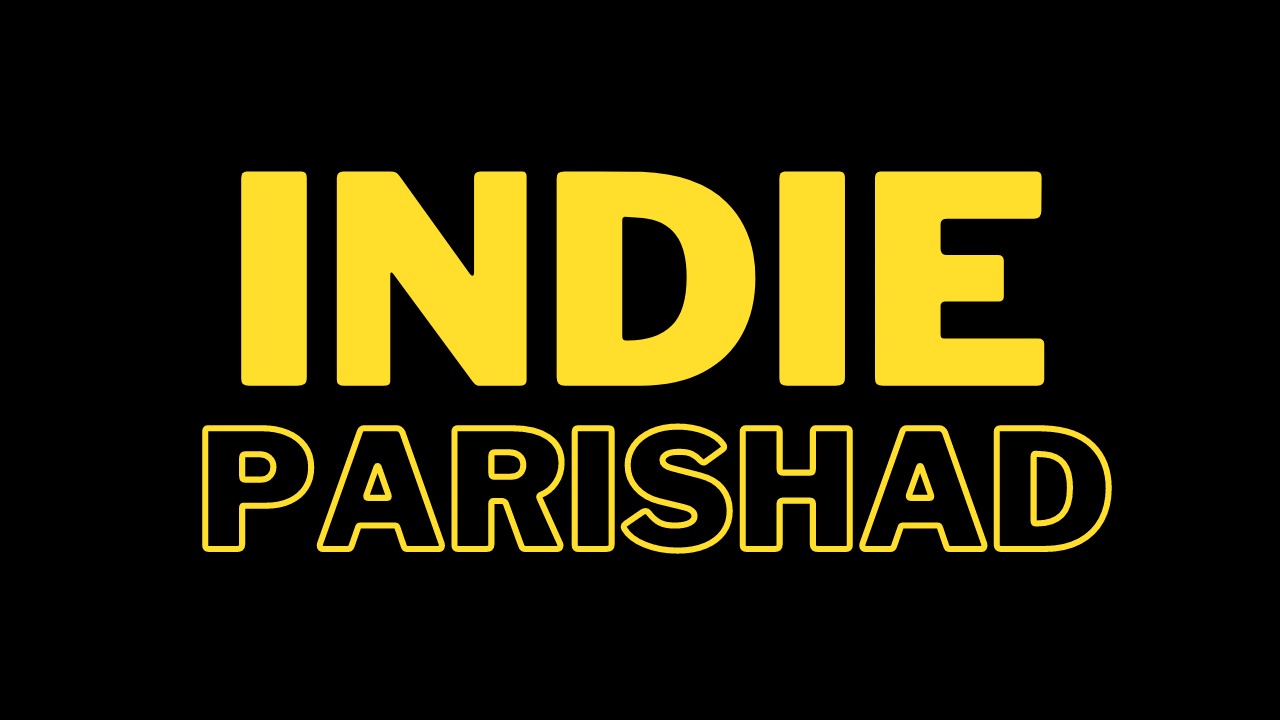
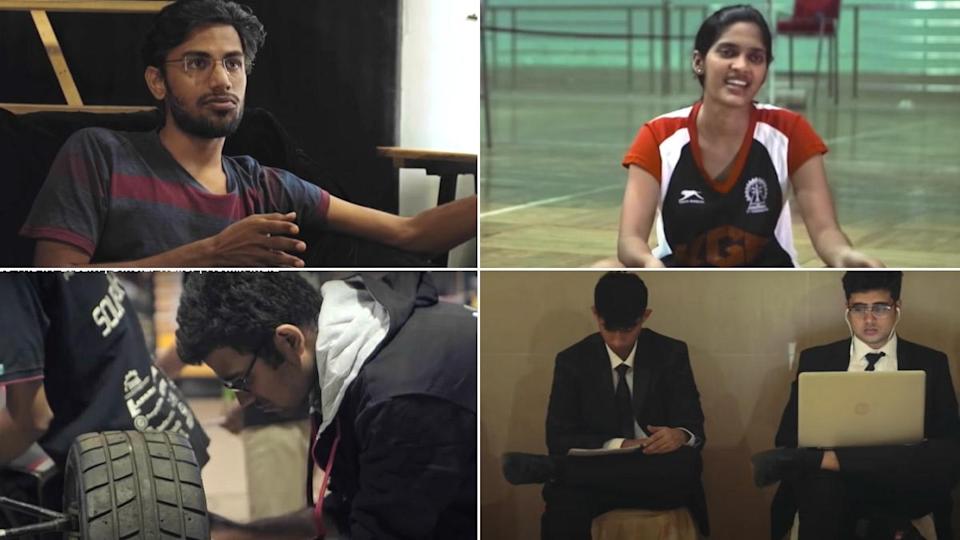
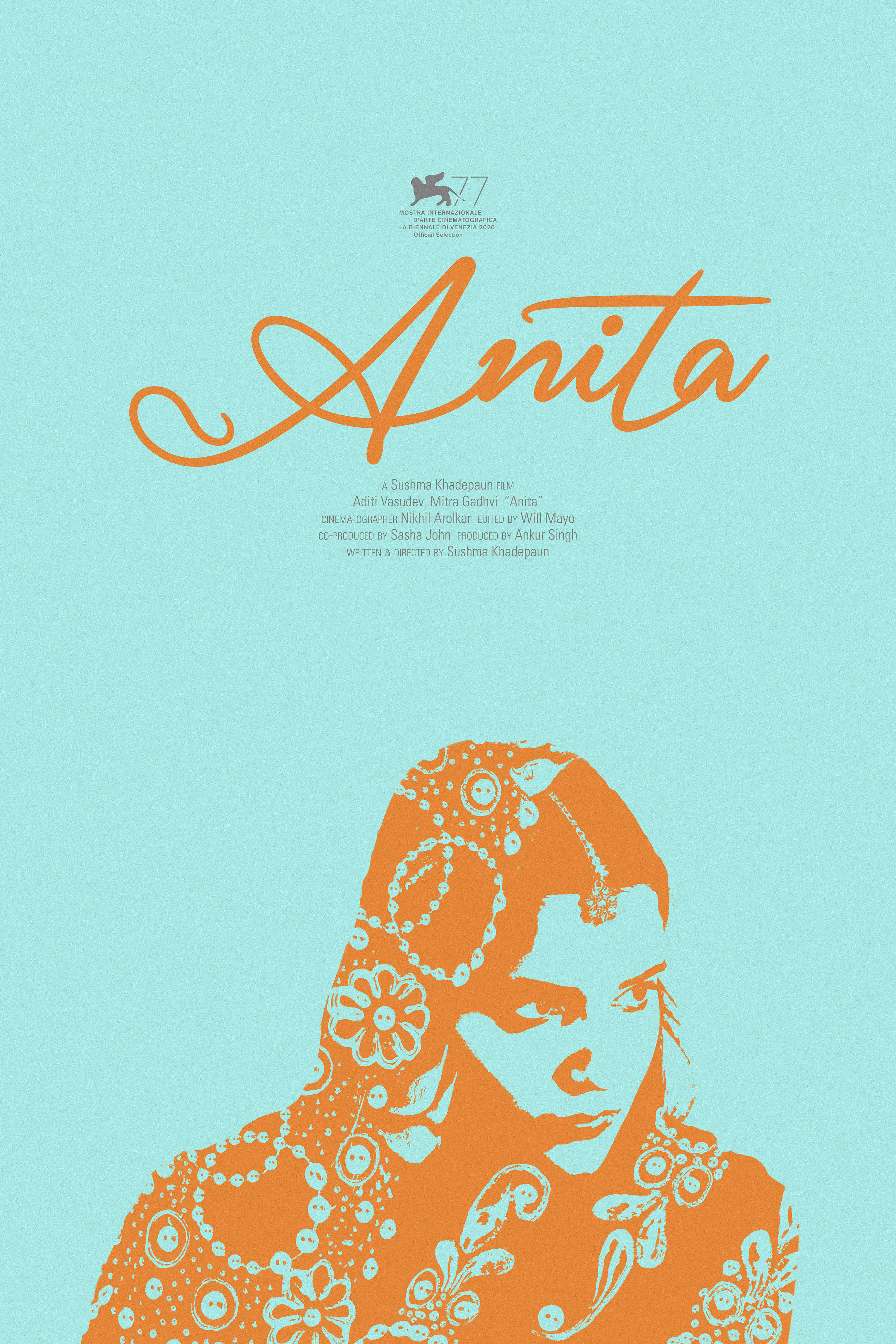
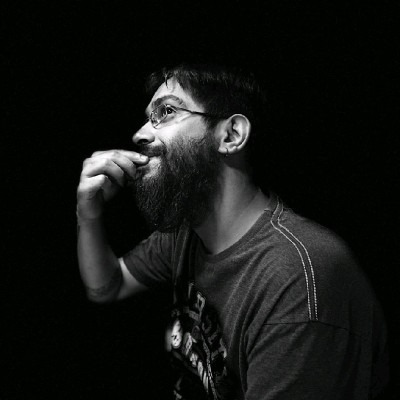


Leave A Comment
You must be logged in to post a comment.